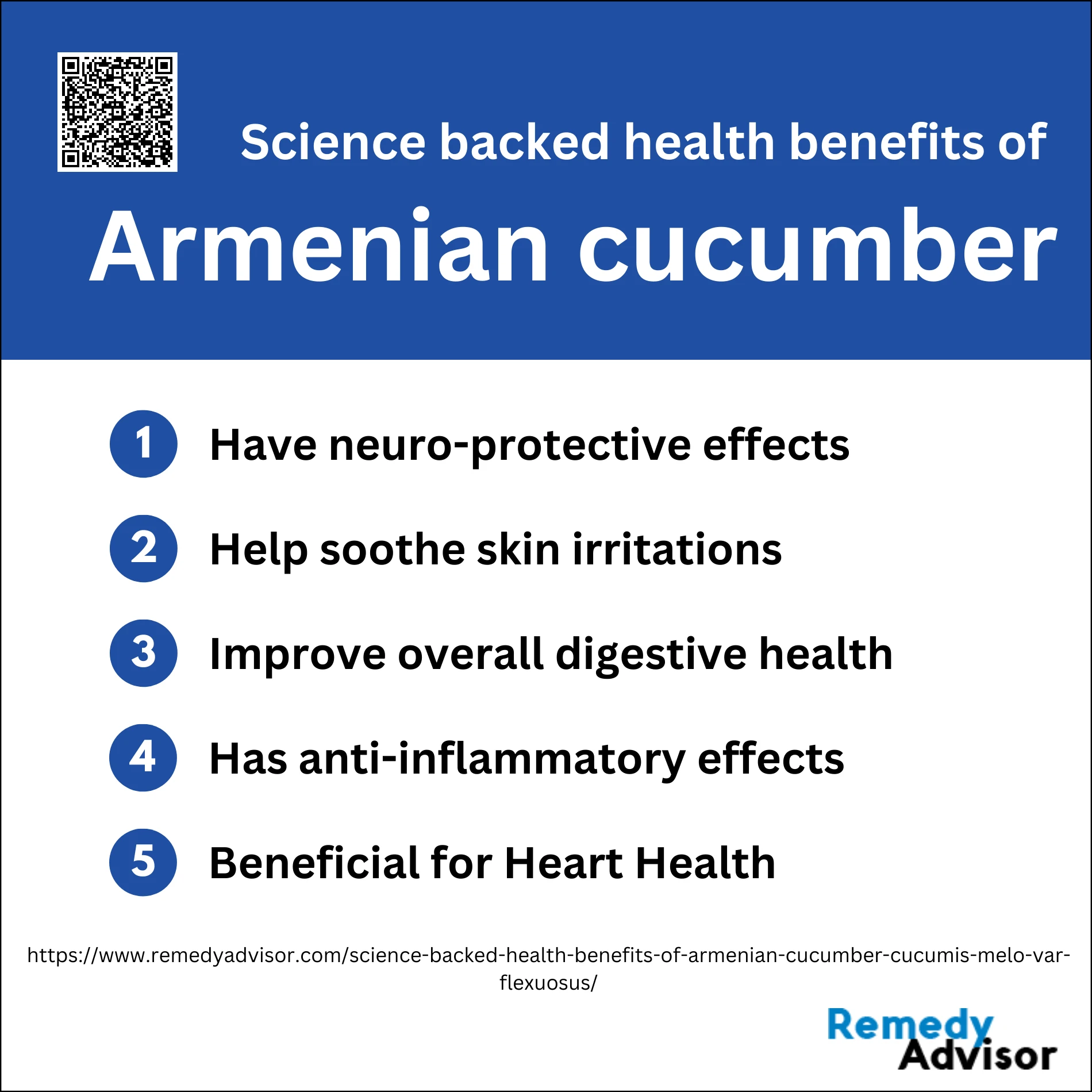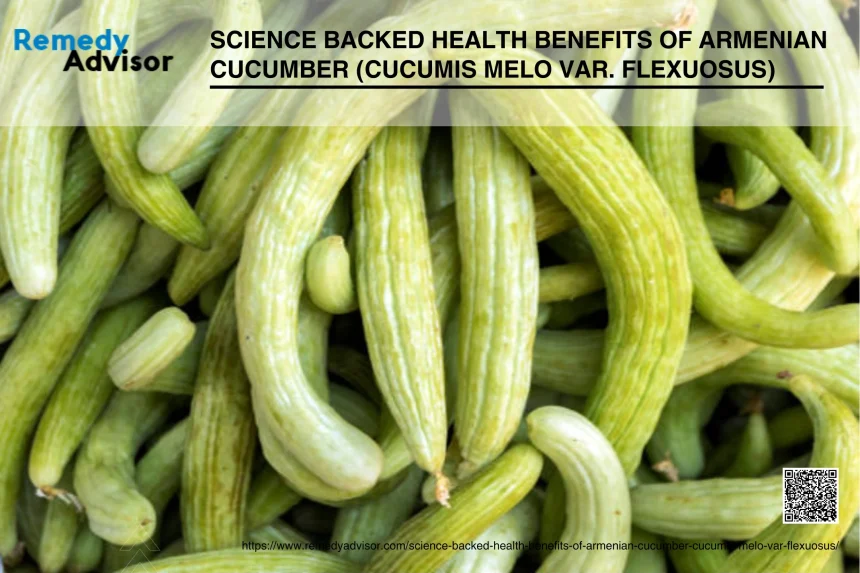The science-backed health benefits of Armenian cucumber (Cucumis melo var. flexuosus) are as impressive as they are diverse. This unique variety, also known as snake cucumber or kakdi, is not only a refreshing summer vegetable but also a nutritional powerhouse. Rich in essential vitamins such as A, C, and K, and minerals like potassium and magnesium, Armenian cucumbers offer a range of health benefits. They support cardiovascular health by helping to regulate blood pressure and cholesterol levels, promote digestive health through their high fiber content, and aid in weight management due to their low-calorie profile. Additionally, their high water content makes them excellent for hydration, especially during hot weather. The presence of antioxidants in Armenian cucumbers also helps combat oxidative stress, potentially reducing the risk of chronic diseases. Whether consumed raw in salads, pickled, or cooked in various dishes, incorporating Armenian cucumbers into your diet can contribute significantly to overall health and well-being.
What is Armenian cucumber ?
Armenian cucumber is a significant species within the Cucurbitaceae family, known for its economic importance. This variety, also referred to as Alqutha cucumber, is cultivated in various regions, including Iraq and India. Research has highlighted its susceptibility to several diseases and environmental stressors. For instance, Fusarium wilt caused by Fusarium oxysporum has been identified as a major threat to Armenian cucumber crops in Iraq, marking the first molecular record of this pathogen on the plant in the region. Additionally, the impact of salinity in irrigation water on the mineral content of Armenian cucumber leaves has been studied, revealing significant variations in potassium and sodium levels among different cultivars. Furthermore, the association of tomato leaf curl Palampur virus (ToLCPV) with yellow mosaic disease in Armenian cucumber has been documented in India, indicating the plant’s vulnerability to viral infections. These findings underscore the need for ongoing research and management strategies to mitigate the challenges faced by Armenian cucumber cultivation.
Nutritional Profile
Armenian cucumbers boast a robust nutritional profile that makes them a valuable addition to a healthy diet. They are rich in essential vitamins and minerals, providing a range of health benefits. This variety of cucumber is particularly noted for its high content of vitamins A, C, and K, as well as minerals like potassium, magnesium, and manganese. Additionally, Armenian cucumbers are packed with antioxidants such as beta-carotene and lutein, which help combat oxidative stress and support overall health. Their high fiber content aids in digestion and promotes satiety, making them an excellent choice for weight management. Moreover, their low-calorie and high-water content make them a refreshing and hydrating option, especially during hot weather.
Vitamins: A, C, K
Armenian cucumbers are an excellent source of vitamins A, C, and K. Vitamin A is crucial for maintaining healthy vision, immune function, and skin health. Vitamin C is a powerful antioxidant that supports the immune system, aids in collagen production, and enhances iron absorption. Vitamin K plays a vital role in blood clotting and bone health. Consuming Armenian cucumbers can help ensure you receive these essential vitamins, contributing to overall well-being and disease prevention.
Minerals: Potassium, Magnesium, Manganese
In addition to vitamins, Armenian cucumbers are rich in important minerals such as potassium, magnesium, and manganese. Potassium is essential for maintaining proper electrolyte balance, nerve function, and muscle contraction. Magnesium supports numerous biochemical reactions in the body, including energy production, protein synthesis, and blood glucose control. Manganese is involved in bone formation, blood clotting, and reducing inflammation. Including Armenian cucumbers in your diet can help you meet your daily mineral requirements and support various bodily functions.
Antioxidants: Beta-carotene, Lutein

Armenian cucumbers contain significant amounts of antioxidants, including beta-carotene and lutein. Beta-carotene, a precursor to vitamin A, is known for its role in maintaining healthy vision and skin. Lutein is particularly beneficial for eye health, as it helps protect against age-related macular degeneration and cataracts. These antioxidants also help neutralize free radicals, reducing oxidative stress and lowering the risk of chronic diseases. Regular consumption of Armenian cucumbers can provide these protective benefits, promoting long-term health.
Fiber Content
Armenian cucumbers are a good source of dietary fiber, which is essential for maintaining a healthy digestive system. Fiber helps regulate bowel movements, prevent constipation, and promote a feeling of fullness, which can aid in weight management. It also supports a healthy gut microbiome by serving as a prebiotic, fostering the growth of beneficial bacteria. Incorporating fiber-rich foods like Armenian cucumbers into your diet can improve digestive health and contribute to overall wellness.
Low-Calorie and High-Water Content
One of the standout features of Armenian cucumbers is their low-calorie and high-water content. With only about 15 calories per 100 grams, they are an ideal snack for those looking to manage their weight without compromising on nutrition. The high water content, approximately 96%, makes them incredibly hydrating, which is especially beneficial during hot weather or after physical activity. This combination of low calories and high hydration makes Armenian cucumbers a refreshing and guilt-free addition to any diet
Science backed health benefits of Armenian cucumber
The science-backed health benefits of Armenian cucumber are truly remarkable and worthy of attention. This unique vegetable, also known as snake cucumber or kakdi, is not only a refreshing summer treat but also a nutritional powerhouse. From boosting hydration to supporting cardiovascular health, the Armenian cucumber offers a plethora of benefits backed by scientific research. In this article, we will explore the top health advantages of incorporating Armenian cucumber into your diet, highlighting its rich content of vitamins, minerals, antioxidants, and fiber, as well as its low-calorie and high-water composition. Get ready to discover why this versatile vegetable deserves a spot in your daily meals.

1. Have neuro-protective effects
Armenian cucumber has shown promising neuroprotective effects, which are attributed to its rich composition of antioxidants and essential nutrients. These cucumbers contain significant amounts of beta-carotene and lutein, both of which are known to combat oxidative stress and reduce inflammation, key factors in neurodegenerative diseases. Additionally, the presence of essential minerals like magnesium and potassium supports neural function and overall brain health. While specific studies on Armenian cucumber’s neuroprotective properties are limited, the general health benefits of its nutrients suggest a potential role in protecting against cognitive decline and supporting brain health.
What research Says?
- Armenian cucumber seeds are rich in protein (15.75%), carbs (16.19%), and oil (22.33%). They have a lot of linoleic acid (61.4%) and γ-tocopherol (96.5%). These parts are good for the brain because they help protect it from damage.
2. Help soothe skin irritations

Armenian cucumber has demonstrated potential in soothing various skin irritations, thanks to its cooling and anti-inflammatory properties. The high water content (approximately 96%) in Armenian cucumbers helps hydrate and refresh the skin, while its antioxidants and vitamins contribute to overall skin health. When applied topically, Armenian cucumber can help reduce redness, swelling, and discomfort associated with sunburns, insect bites, and rashes. Its natural astringent properties may also help tighten pores and cleanse the skin, potentially aiding in the management of acne-prone skin. Additionally, the cucumber’s ability to cool and calm irritated skin makes it an excellent natural remedy for soothing inflammation and reducing puffiness, particularly around the eye area.
What Research Says?
- Cucumbers, including Armenian cucumber, have been noted for their soothing effects on skin irritations and their ability to reduce swelling and inflammation.
- Cucumbers have a lot of water, which helps keep your skin moist and calm. This is great for healing burns and scrapes.
- Cucumbers have vitamins A, C, and K. These help soothe the skin. They nourish it and help it heal.
3. Improve overall digestive health
Armenian cucumber has been shown to significantly improve overall digestive health, thanks to its unique combination of nutrients and properties. The high fiber content in Armenian cucumbers aids in promoting regular bowel movements and preventing constipation, which is crucial for maintaining a healthy digestive system. Additionally, its high water content (approximately 96%) helps to keep the digestive tract hydrated, facilitating smoother digestion and nutrient absorption. The cucumber’s natural enzymes and mild diuretic properties can help flush out toxins from the body, supporting the digestive system’s cleansing processes. Furthermore, Armenian cucumbers are known for their cooling and soothing effects on the digestive tract, which can help alleviate symptoms of indigestion and heartburn. Their low-calorie nature also makes them an excellent choice for those looking to maintain a healthy weight while supporting digestive health.
What research Says?
- Cucumbers, like the Armenian variety, are good for digestion. They have a lot of water and fiber. This helps stop constipation and keeps bowel movements regular.
- The fruit of Cucumis melo var. flexuosus helps with digestion and calms the stomach.
- Cucumbers have lots of important nutrients like potassium, fiber, magnesium, manganese, and vitamins A, C, and K. These help your digestion and support your body’s functions.
4. Has anti-inflammatory effects
While specific studies on Armenian cucumber are limited, research on cucumbers in general provides insight into their anti-inflammatory properties. Cucumbers contain antioxidants such as flavonoids and tannins, which have been shown to reduce inflammation in the body. The high water content and presence of vitamin C in Armenian cucumbers also contribute to their anti-inflammatory effects by helping to flush out toxins and reduce oxidative stress. Additionally, cucumbers contain compounds called cucurbitacins, which have been found to have anti-inflammatory properties. These properties may help alleviate symptoms of various inflammatory conditions, such as arthritis and asthma. The cooling and soothing effects of Armenian cucumbers, when applied topically, can also help reduce skin inflammation and irritation.
What Research Says?
- Cucumber, from the Cucurbitaceae family, has anti-inflammatory features. People use it in old remedies to calm skin problems and lessen swelling.
5. Beneficial for Heart Health

Armenian cucumber offers significant benefits for heart health, making it a valuable addition to a cardiovascular-friendly diet. Rich in potassium, this variety of cucumber helps regulate blood pressure by counteracting the effects of sodium, thus reducing the risk of hypertension. The high water content and low calorie profile of Armenian cucumbers support weight management, an essential factor in maintaining heart health. Additionally, these cucumbers contain cucurbitacins, compounds that have shown potential in preventing atherosclerosis, the buildup of fatty deposits in arteries. The fiber content in Armenian cucumbers aids in reducing cholesterol levels, which is crucial for heart disease prevention. Furthermore, studies have indicated that extracts from Cucumis melo varieties can have cardioprotective effects, potentially reducing the risk of cardiovascular complications in high-fat diet-induced obesity.
What Research Says?
- Cucumis sativus seed oil, like that from Armenian cucumbers, has lots of linoleic and oleic acids. These fats can boost HDL (good cholesterol) and lower total cholesterol and LDL (bad cholesterol). This may help stop heart diseases.
Popular Culinary Uses in Different Cultures
Armenian cucumbers are celebrated in various culinary traditions around the world. In Armenia, they are often used in traditional dishes like Jajik, a refreshing yogurt and cucumber salad with garlic and mint. In the Middle East, they are commonly found in salads and pickles, adding a crisp and slightly sweet flavor. In Japan, Armenian cucumbers are used in sunomono, a type of vinegar-based salad. In the United States, they are popular in summer salads and as a crunchy addition to sandwiches. Their versatility and unique texture make them a favorite ingredient in many global cuisines.
Easy and Healthy Recipes Incorporating Armenian Cucumber
Incorporating Armenian cucumbers into your meals is both easy and healthy. Their mild flavor and crunchy texture make them a perfect addition to a variety of dishes. You can enjoy them raw in salads, blended into smoothies, pickled for a tangy snack, or even grilled for a unique twist. These cucumbers are not only delicious but also packed with nutrients, making them an excellent choice for a healthy diet. Here are some simple and nutritious recipes to get you started with Armenian cucumbers.
Salads

Armenian cucumbers shine in salads, offering a refreshing crunch and subtle sweetness. A popular recipe is the Armenian Cucumber and Tomato Salad, which combines sliced cucumbers with juicy tomatoes, fresh herbs like cilantro and parsley, and a simple lemon vinaigrette. This salad is light, hydrating, and perfect for a summer meal. Another favorite is the Cucumber Yogurt Salad (Jajik), where cucumbers are mixed with yogurt, garlic, and mint, creating a cooling side dish that pairs well with spicy foods.
Smoothies
For a refreshing and nutritious drink, try incorporating Armenian cucumbers into your smoothies. A Cucumber Smoothie with Pineapple and Banana is a delightful option. Blend sliced Armenian cucumber with pineapple, banana, spinach, and a splash of lime juice for a vibrant green smoothie that’s hydrating and packed with vitamins. The cucumber adds a subtle earthy flavor and a high water content, making the smoothie both refreshing and healthy.
Pickles
Pickling Armenian cucumbers is a fantastic way to preserve their crunch and flavor. Pickled Armenian Cucumbers are easy to make and offer a tangy, crunchy snack. Simply slice the cucumbers and immerse them in a brine made of vinegar, water, salt, and pickling spices. After a few days in the refrigerator, they develop a delicious tangy flavor that pairs well with sandwiches, burgers, or as a standalone snack.
Grilled Dishes
Grilling Armenian cucumbers might sound unusual, but it brings out a unique flavor and texture. Grilled Armenian Cucumber Steaks are a great vegetarian option. Slice the cucumbers into thick rounds, brush with olive oil, and season with salt, pepper, and your favorite spices. Grill them until they have nice char marks and serve as a side dish or a main course. The grilling process enhances their natural sweetness and adds a smoky flavor, making them a delightful addition to your summer barbecue menu.
Potential Side Effects and Considerations
Allergic Reactions
While Armenian cucumber is generally considered safe for consumption, some individuals may experience allergic reactions. These reactions can range from mild to severe and may include symptoms such as itching, swelling of the lips, tongue, or throat, hives, and in rare cases, anaphylaxis. People with known allergies to other members of the Cucurbitaceae family, such as melons, pumpkins, or squash, may be at higher risk for cross-reactivity. Additionally, those with latex allergies should exercise caution, as there is a potential for cross-reactivity due to similar proteins found in both latex and cucumbers. If you experience any allergic symptoms after consuming Armenian cucumber, it’s essential to seek medical attention immediately.
Overconsumption Concerns
While Armenian cucumbers are generally safe and nutritious, overconsumption may lead to some adverse effects. Due to their high water and fiber content, eating excessive amounts of Armenian cucumbers may cause digestive discomfort, including bloating, gas, and diarrhea. Additionally, cucumbers contain cucurbitacins, which can cause bitterness and may lead to indigestion or stomach upset when consumed in large quantities. Some individuals may also experience increased urination due to the cucumber’s diuretic properties, which could potentially lead to electrolyte imbalances if not properly managed. It’s important to consume Armenian cucumbers as part of a balanced diet and to listen to your body’s signals to avoid overconsumption.
Interaction with Medications
Armenian cucumbers may interact with certain medications, potentially affecting their efficacy or causing unwanted side effects. One notable interaction is with blood-thinning medications such as warfarin. Armenian cucumbers contain vitamin K, which plays a role in blood clotting. Consuming large amounts of cucumber while on blood thinners may interfere with the medication’s effectiveness. Additionally, the diuretic properties of cucumbers may interact with medications that affect kidney function or blood pressure. For individuals with diabetes, the cucumber’s potential to lower blood sugar levels could interact with anti-diabetic medications, potentially causing hypoglycemia. It’s crucial for patients taking any regular medications to consult with their healthcare provider before significantly increasing their intake of Armenian cucumbers or using cucumber-based supplements.
Conclusion
In conclusion, Armenian cucumbers offer a wealth of health benefits backed by scientific research. These versatile vegetables are packed with essential vitamins, minerals, antioxidants, and fiber, while being low in calories and high in water content. They contribute to improved digestive health, have anti-inflammatory and neuroprotective effects, soothe skin irritations, and support heart health. Armenian cucumbers are also easy to incorporate into various dishes across different culinary traditions, making them a delicious and nutritious addition to any diet. While generally safe for consumption, it’s important to be aware of potential allergic reactions, overconsumption concerns, and possible interactions with certain medications. By including Armenian cucumbers in a balanced diet, individuals can enjoy their refreshing taste while reaping numerous health benefits.
ADDITIONAL RESOURCES
Here is a list of US organizations involved in research on vegetables, along with their descriptions and URLs:
1. American Society for Horticultural Science (ASHS)
ASHS promotes and encourages scientific research and education in horticulture in all its branches, including vegetable production and breeding.
2. The University of California Agriculture and Natural Resources (UC ANR)
UC ANR conducts research and extension programs to develop and apply knowledge on agriculture, natural resources, and human and community development, with a focus on vegetable crops.
Rodale Institute conducts research on organic farming practices, including sustainable vegetable production and soil health improvement.
Recommendations for books on Armenian cucumbers
Here are some recommendations for books on research related to Armenian cucumbers, along with links where you can find them:
1. “Cucumbers: Genetics, Genomics and Breeding of Cucumbers“
This book covers the genetics, genomics, and breeding techniques of cucumbers, including Armenian cucumbers, providing comprehensive insights into their research and cultivation.
2. “The Cucurbitaceae: Ethnobotany and Ethnopharmacology“
This book explores the ethnobotany and ethnopharmacology of the Cucurbitaceae family, which includes Armenian cucumbers, providing insights into their traditional uses and medicinal properties.
FAQS
- What are the main nutritional benefits of Armenian cucumber?
Armenian cucumber is rich in vitamins A, C, K, and potassium. It also contains other micronutrients and is a good source of dietary fiber. These nutrients contribute to overall health and well-being.
- How does Armenian cucumber support hydration?
Due to its high water content, Armenian cucumber is an excellent source of hydration, especially during hot weather. Consuming this cucumber can help maintain proper fluid balance in the body.
- Can Armenian cucumber aid in weight management?
Yes, Armenian cucumber can be beneficial for weight management. It is low in calories and high in fiber, which can help promote feelings of fullness and support healthy weight loss efforts.
- Does Armenian cucumber have any digestive health benefits?
The fiber content in Armenian cucumber can help relieve constipation and support overall digestive health. Regular consumption may contribute to a healthier gut.
- Are there any cardiovascular benefits associated with Armenian cucumber?
While specific studies on Armenian cucumber are limited, its fiber content may help lower the risk of heart disease. Additionally, its potassium content could contribute to maintaining healthy blood pressure levels.
- How does Armenian cucumber support skin health?
Armenian cucumber is rich in antioxidants, which can help protect the skin from harmful UV rays. Its high water content also contributes to skin hydration and overall skin health.
- Can Armenian cucumber help regulate blood sugar levels?
Some sources suggest that cucumbers, in general, may be effective in keeping blood sugar under control. However, more specific research on Armenian cucumber’s effect on blood sugar is needed.
- Does Armenian cucumber have anti-inflammatory properties?
Armenian cucumber contains antioxidants such as flavonoids and tannins, which have anti-inflammatory properties. These compounds may help reduce inflammation in the body.
- How does Armenian cucumber compare to regular cucumber in terms of health benefits?
Armenian cucumber offers similar benefits to regular cucumber, including hydration, nutrient content, and low calorie count. Both are considered healthy additions to a balanced diet.
- Are there any potential health risks or side effects of consuming Armenian cucumber?
Armenian cucumber is generally safe for consumption. However, those with cough, cold, and asthma should avoid eating them after sunset and at night due to their high water content. As with any food, moderation is key, and individuals with specific health concerns should consult their healthcare provider.







